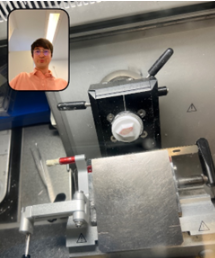Arman Tavallaei, the Student Ambassador, embraces the lab experience, gaining valuable knowledge and fueling his passion for scientific discovery. Join him in the pursuit of knowledge and endless curiosity!
Every time I tell people I work in a lab, I get a nearly uniform response: “Wait why?! Enjoy your time dude.” But to those really into science, it may just seem like fiction, as you usually wait until 4th Year for a lab placement. In truth, it’s pretty easy to do once you know how to approach it.
Why Work in a Lab?
Working in the lab, I’m able to gain experience and use the time between lectures to enhance not only my “textbook” knowledge but also the practical stuff. It helps especially on those days with only one in-person lecture, or a 9am followed by a 5pm lecture—instead of going back to my flat, I can stay on campus, save time and money commuting, and work in the lab.

Cryosectioning, a skill I learned being in a lab.
Getting a Lab Position
At Trinity, we have an amazing teaching faculty that run their own labs too. And that’s the easiest way to reach out to professors: just asking questions and reaching out to them after class, asking if they have an opening in their lab.
If you don’t have a professor like that, then Option 2 is also straightforward. Do your research beforehand: look online on department websites. There will be a long list of professors, called principal investigators (PIs), and links to their individual pages. It’s important to read up on the kind of research they do, because you don’t want to end up in a lab that you’re not interested in. But it’s also important to not be too picky: if you are even a little interested, add that professor to your list.
For each lab you’re interested in, you’ll send a personalized email detailing exactly what it is about their lab or research that interests you, and what skills you can bring to the table. It’s also smart to attach a CV with any prior experience. Don’t worry if you don’t have any lab experience! As an undergraduate, this is where you build up that experience, and everyone has to start from somewhere.

At Trinity’s Smurfit Institute of Genetics, my first day of working in a lab!
Last summer, my list was 20 names long and I sent each a personal email. About half of them responded, with 6 saying they didn’t have capacity. Of the 4 left, one was interested, another had multiple applicants and wanted to interview us, and the other 2 took too long to respond. So with the one that was interested, what happens is the PI has an informal chat with you, to kind of put a face to the name and sort out any logistics. Before this meeting, make sure to print out your CV and bring it as a hard copy to the meeting. It’s also useful to do more reading on publications from the lab—use PubMed to search for the PI’s name and be sure to prioritise more recent publications. If all goes well, they will welcome you to start in the lab under the supervision of a Master’s or PhD student. And if you’re lucky, it may even be paid!
Last summer, I worked in a genetics lab studying the retina (in the eye) and learned different skills from cryosectioning, to running qPCRs, in addition to meeting everyone in the lab. Today, I’ve moved on to a neuroscience lab working in a different realm of research, studying behaviour in mice. As an undergraduate, I don’t have an animal licence yet, so I cannot run my own behavioural experiments, but there’s still so much work to be done.
Working in a lab while also going to classes is no expectation, but it’s one of the ways I push myself to do more. Running a lab is something I hope to do as a career one day, so it’s never too early to get started!
Arman is studying Neuroscience at Trinity College Dublin

